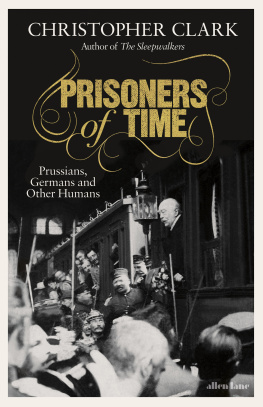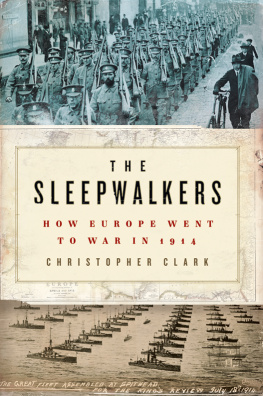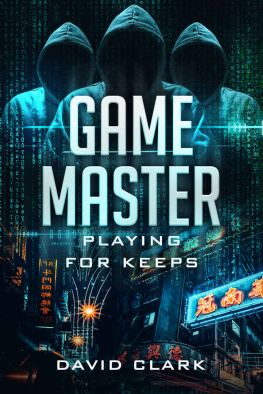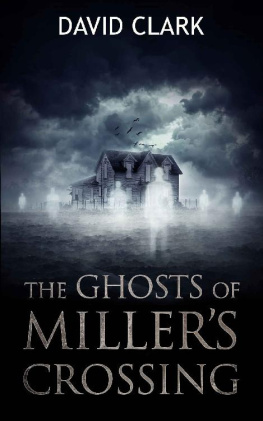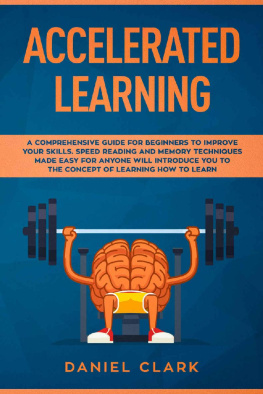Christopher Clark - Prisoners of Time
Here you can read online Christopher Clark - Prisoners of Time full text of the book (entire story) in english for free. Download pdf and epub, get meaning, cover and reviews about this ebook. year: 2021, publisher: Penguin Books Ltd, genre: Politics. Description of the work, (preface) as well as reviews are available. Best literature library LitArk.com created for fans of good reading and offers a wide selection of genres:
Romance novel
Science fiction
Adventure
Detective
Science
History
Home and family
Prose
Art
Politics
Computer
Non-fiction
Religion
Business
Children
Humor
Choose a favorite category and find really read worthwhile books. Enjoy immersion in the world of imagination, feel the emotions of the characters or learn something new for yourself, make an fascinating discovery.
- Book:Prisoners of Time
- Author:
- Publisher:Penguin Books Ltd
- Genre:
- Year:2021
- Rating:3 / 5
- Favourites:Add to favourites
- Your mark:
- 60
- 1
- 2
- 3
- 4
- 5
Prisoners of Time: summary, description and annotation
We offer to read an annotation, description, summary or preface (depends on what the author of the book "Prisoners of Time" wrote himself). If you haven't found the necessary information about the book — write in the comments, we will try to find it.
Prisoners of Time — read online for free the complete book (whole text) full work
Below is the text of the book, divided by pages. System saving the place of the last page read, allows you to conveniently read the book "Prisoners of Time" online for free, without having to search again every time where you left off. Put a bookmark, and you can go to the page where you finished reading at any time.
Font size:
Interval:
Bookmark:
Christopher Clark is the Regius Professor of History at the University of Cambridge. He was knighted in 2015. He is the author of The Politics of Conversion, Kaiser Wilhelm II, Iron Kingdom, The Sleepwalkers and Time and Power and is currently writing a history of the revolutions of 1848.
The Dream of Nebuchadnezzar draws on material published in the essay Power in Ulinka Rublack (ed.), A Concise Companion to History (OUP: Oxford, 2012). A version of Why Does a Battle Matter? appeared in Anglo-Norman Studies XXXIX (Proceedings of the Battle Conference 2016). The Life and Death of Colonel General Blaskowitz is a revised version of an essay published in Daniela Baratieri, Mark Edele and Giuseppe Finaldi (eds.), Totalitarian Dictatorship: New Histories (Routledge: New York, London, 2014). Psychograms from the Third Reich is based on three review pieces for the London Review of Books. The Futures of War is based on a review piece published in the New York Review of Books.


I want to begin these thoughts with the Book of Daniel. Chapter 2 of this book opens with a scene involving King Nebuchadnezzar II of the Neo-Babylonian Empire, who reigned from 605 BC until 562 BC forty-three years in all. Today Nebuchadnezzar is mainly known for two things: building the Hanging Gardens of Babylon one of the wonders of the ancient world and for besieging Jerusalem and destroying its temple, inaugurating the so-called Babylonian Captivity of the Judeans.
Chapter 2 of the Book of Daniel recalls a morning in the second year of Nebuchadnezzars reign, after the sacking of Jerusalem. The king wakes up disturbed by a dream. He cant find rest. He summons his wise men, the astrologers, and the sorcerers, and the Chaldeans. They appear. They ask him to describe the dream. He cant. The thing is gone from me. It seems the king has forgotten his dream. At this point the mood in the room plummets. The wise men (who are now not feeling very wise) try as gently as they can to break the news that their transferable skills, impressive as they are, do not include reading the minds of sleeping kings: it is a rare thing that the king requireth, and there is none other that can shew it before the king, except the gods, whose dwelling is not with flesh. In other words: Sorry boss, this is way above our pay grade. The wise men are presumably feeling apprehensive at this point, and with good reason, because a moment later the king says: If ye will not make known unto me the dream, with the interpretation thereof, ye shall be cut in pieces, and your houses shall be made a dunghill. The conversation continues, but the thrust of the kings position is already clear. The wise men are a waste of space. This empire has had enough of experts. In his rage, the king orders that every wise man in Babylon be executed.
The kings execution order stirs consternation. Among those who are shocked to learn of it is a young Jewish captive, in effect a prisoner of war, by the name of Daniel a man of noble birth who had lived through the siege and destruction of the city of Jerusalem. Daniel was one of a group of handsome and intelligent young Israelites from good families who had been brought back from the defeated city to be taught the literature and language of Babylon and serve in the monarchs court. So Daniel, too, was among those wise men who faced execution if the kings decree were to be carried out. The book records that Daniel speaks to one of the palace guards. He asks whats up with the king. The guard explains. Daniel wants to know if he can get some face-time with the monarch (Im translating freely from the Aramaic here). The guard agrees to fix a meeting. Daniel goes to the friends he shares his apartment with: Hananiah, Mishael and Azariah. Guys, he says, lets pray to God for insight. Lets desire mercies of the God of heaven concerning this secret.
The next morning, Daniel goes to the king. We have to imagine that the king is initially sceptical: if the wise men of Babylon have collectively failed in this task, what should Daniel hope to accomplish? But to the kings astonishment, Daniel describes the dream, or, rather, he describes a dream, a dream that he hopes the king will accept as his own. He frames it not just as an alarming nocturnal experience, but as a prophetic revelation: O king, thy thoughts came into thy mind upon thy bed, what should come to pass hereafter: and he that revealeth secrets maketh known to thee what shall come to pass. And then comes the dream itself. The king, Daniel says, had beheld a colossus: This great image, whose brightness was excellent, stood before thee; and the form thereof was terrible. Its head was of gold, as brilliant as the sun. Its breasts and arms were of silver. Its belly and thighs were of bronze. Its feet were part of iron and part of clay.
But what does it mean, the king asks. One can only suppose that Daniel felt tremendous relief at this point. After all, he had no way of knowing whether the king would accept the dream Daniel had proposed to him. Daniel begins his exegesis of the dream he has put into the kings head: Thou, O king, art this head of gold. For wheresoever the children of men dwell, the beasts of the field and the fowls of the heaven hath he given into thine hand, and hath made thee ruler over them all. At this point, one has to admit, Daniel is handling the situation brilliantly. He flatters the king, first, by suggesting that he is the privileged receiver of mysteries divulged by the hidden master of all secrets and second, by implying that this divine authority underwrites the kings power. The king wants to know more: what are the silver breasts, the belly of bronze, the iron thighs, etc. for? Daniel explains: after the golden age of Nebuchadnezzar, whose lustre will never be outshone, will come a lesser age of mere silver, and then an even lesser age merely of bronze. And then will come a really quite crap age of iron and clay when men shall fight men and kings shall fight kings. And in the days of these kings shall the God of heaven set up a kingdom, which shall never be destroyed. There are other details to the dream and to Daniels exegesis that I shall not deal with here.
The kings reaction to all of this is quite extraordinary: Then the king Nebuchadnezzar fell upon his face, and worshipped Daniel, and commanded that they should offer an oblation and sweet odours unto him. The mass execution of the wise men is cancelled. There are some further complications in this story: Nebuchadnezzars mood swings get a lot worse he spends a seven-year period in a state of mental anguish living with beasts in caves and fields. In the early nineteenth century, William Blake captured this phase of his life in an unforgettable print, naked, dirty and crawling on all fours, Nebuchadnezzar stares at the viewer in swivel-eyed mania (). The Book of Daniel, a very eccentrically structured text, records various further dreams and visions, and Daniel gets into some hot spots, most famously an intimidating encounter with some lions in a den.
But if we reflect on the opening scene in which Daniel narrates and interprets the dream, we find in it a beautiful and subtle fable on power. The story tells us that the most powerful man in the world is powerless before his night terrors. He summons the holders of bureaucratic power, the experts, the custodians of privileged knowledge. But they fail to come up with a solution, and as a result they forfeit their power and even, potentially, their lives. And into this fraught constellation steps someone with no power at all: a rightless young alien, a prisoner of war, a captive from a sacked city. The jury is still out on whether God actually told Daniel the kings dream, or whether the young man didnt simply possess the human insight required to understand the true nature of the kings predicament. Later in the book there are verses thanking God for lending Daniel a helping hand. But this is an interpolation. The story itself suggests something different, namely that the young man understood how to read the situation in which the king found himself. What could a man as powerful as Nebuchadnezzar possibly fear, other than his own mortality? And how better to reconcile him with that terrible certainty than to establish his eternal primacy over the rest of human endeavour? At the same time, Daniel imparted to the king something he had himself experienced as the son of a destroyed city, a piece of wisdom, namely, that power is
Font size:
Interval:
Bookmark:
Similar books «Prisoners of Time»
Look at similar books to Prisoners of Time. We have selected literature similar in name and meaning in the hope of providing readers with more options to find new, interesting, not yet read works.
Discussion, reviews of the book Prisoners of Time and just readers' own opinions. Leave your comments, write what you think about the work, its meaning or the main characters. Specify what exactly you liked and what you didn't like, and why you think so.

